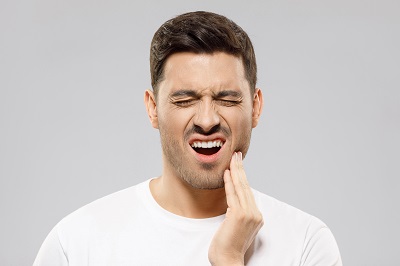When you experience tooth pain or oral discomfort in general, your first thought may be: “time to go to the dentist!” Oftentimes, this is immediately followed with a second thought like, “but is this really a dental emergency?”

We at Stiles Dental Care are happy to welcome you to our clinic, no matter the size of your pain. But we get it: we’re all busy.
So how do you know if your tooth pain is a dental emergency? Read on to learn how.
How do I know I have a dental emergency?
A dental emergency can be defined as any oral health issue that requires immediate care by your dental health expert.
Our bodies let us know when something is wrong. When it comes to oral health, you may experience a toothache in a specific spot, or a general feeling of discomfort.
To be more precise, when you experience a dental emergency, expect the following:
- Severe pain at the tooth or gum site
- Bleeding
- A tooth that’s loose or has fallen out
- Swelling around your face or gums
Severe pain can have several causes and should never be ignored. Consider if your pain has grown and has increased sensitivity to the touch of your tongue or the temperature of beverages.
Bleeding is also an indicator that something isn’t right. Bleeding commonly occurs with other symptoms, such as aching gums.
Adults should never experience a loose tooth or a tooth that’s fallen out. There could be damage to the nerves or jaw, both of which require treatment.
And swelling often indicates an infection, which can be extremely serious. Swelling may be accompanied by dizziness, a fever, and a bad taste in your mouth.
All of these signs can range in severity but should be taken seriously. Call your dental hygienist and explain your conditions immediately.
What isn’t considered a dental emergency?
To answer this question accurately, honestly assess your level of pain and discomfort. If what you’re experiencing can wait a couple days for your dentist’s schedule to open, you’re not having a dental emergency.
Pain that can be eased with a typical OTC painkiller is not an emergency. Even if you experience a chipped tooth, it may not be an emergency and treatment can wait, as long as there is no serious pain involved.
What should I do if I have a dental emergency?
Call your dental professional and briefly explain your situation to the receptionist. If your dental emergency is affecting your ability to speak clearly, or it hurts too much to talk, ask a nearby loved one to convey your experiences on your behalf.
They will likely tell you to come right over if it is within office hours. Alternatively, if your emergency happens during their off-hours, don’t wait. Head to your nearest emergency care facility. Bring a loved one along if possible, to be sure you arrive and depart safely, in case medication is distributed.
Make note of when the symptoms began and if you’ve been doing anything different lately that may have caused a dental issue. This will help your dental professional determine the best course of action.
Before you get to our clinic or to an emergency room, do the following:
- For severe toothaches, rinse your mouth out with warm water
- Take a painkiller, but do not stick a pill in your mouth at the site of pain
- Apply a cold compress to your face where the pain is most severe
- Keep a knocked-out tooth between your gum and teeth to keep it moist or pack it in milk
These are simple and effective ways to reduce your discomfort and prepare for an emergency visit to the dentist.
What are common dental emergencies?
Common dental emergencies are those we see most often at Stiles Dental Care and that are most likely to occur with the general public.
The most common dental emergencies include:
- Abscesses, which are bacterial Infections that can spread to other parts of the body and become life threatening
- A knocked out tooth, which needs to be saved, roots and all, and brought intact to your dentist to be replanted
- A fractured or cracked tooth, which again, is only an emergency if the crack is deep enough to expose nerve endings
Can I avoid dental emergencies?
Absolutely! There are several ways you can be more careful and considerate of your oral health and potentially prevent a dental emergency.
Here are some quick-tips to consider:
- Avoid chewing popcorn kernels, ice cubes, hard candy, and similar items, as they can easily crack or chip a tooth
- If you’re participating in recreational sports, wear a mouthguard to protect your teeth
- Never use your teeth to open items, just use scissors
Some of these tips may seem obvious. But there are real-life dental emergencies that could have been avoided by following them!
Can I rely on Stiles Dental Care for my dental emergencies?
Yes! If you feel you may be experiencing a dental emergency, feel free to call Stiles Dental Care’s friendly staff at 609.654.0033. Our emergency line is available 24/7.
You can also use our handy appointment portal to schedule a cleaning, consultation, or anything pertaining to our preventive, restorative, or cosmetic dentistry services.
